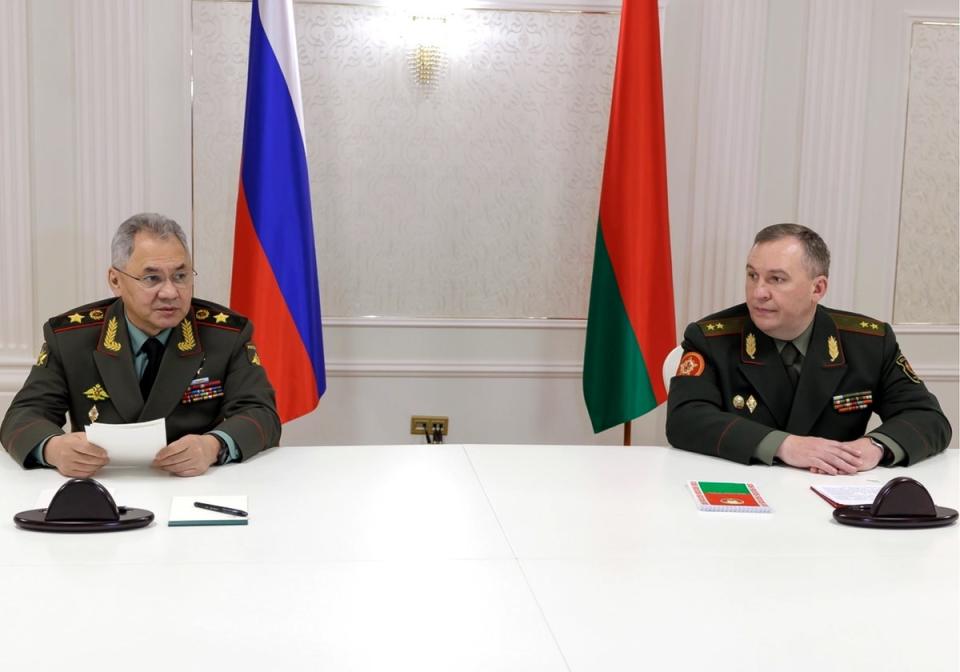Russia has started deploying tactical nuclear warheads to Belarus, says Lukashenko
Russia has started to move tactical nuclear weapons to Belarus in the first such deployment on foreign soil since the fall of the Soviet Union in 1991, according to the Belarusian president.
“The movement of the nuclear weapons has already begun,” Alexander Lukashenko told reporters during a summit of the Eurasian Economic Forum in Moscow. Asked if the weapons were already in Belarus, he said: “Possibly. When I get back I will check.”
The comments came a few hours after the two countries signed a deal formalising the transfer of the weapons, though control over their use remains in the hands of the Kremlin. The move was denounced by the White House as an “example of [Moscow] making irresponsible and provocative choices”.
The US believes Russia has about 2,000 tactical nuclear weapons, which include bombs that can be carried by aircraft, warheads for short-range missiles, and artillery rounds. Such weapons have a relatively short range, and lower yields than nuclear warheads fitted to long-range strategic missiles. The US has around 200 of these tactical weapons, half of which are at bases in Europe.
Belarus borders three Nato members – Poland, Lithuania and Latvia. Russia’s defence minister, Sergei Shoigu, said that Iskander-M missiles, which can carry conventional or nuclear warheads, had been transferred to the Belarusian armed forces. He also said that some Su-25 aircraft had been converted for the possible use of nuclear weapons.
Russian president Vladimir Putin announced the move late in March, having repeatedly warned Western allies about the risks of stepping up their military support for Ukraine in the wake of Moscow’s invasion.
“The collective West is essentially waging an undeclared war against our countries,” Mr Shoigu claimed at a meeting with his Belarusian counterpart in Minsk, according to Russia’s defence ministry. “Deployment of non-strategic nuclear weapons is an effective response to the aggressive policy of countries unfriendly to us,” the Belarusian defence minister, Viktor Khrenin, said at the meeting.
The signing of the deal, which further aligns the two countries’ militaries, comes as Russia prepares for a counteroffensive by Ukraine.

On the battlefield, the head of the Wagner mercenary group, Yevgeny Prigozhin, said his forces had started to withdraw from the eastern Ukrainian city of Bakhmut – and that the group would hand all of its positions over to the Russian army by the beginning of June.
The fight for the city, which has been one of the bloodiest of Moscow’s invasion so far, has taken on symbolic significance for both Ukraine and Russia. Mr Prigozhin claimed last week that his soldiers had taken control of Bakhmut, although Kyiv has denied this, saying that Russia does not control the area and that its own troops retain small footholds in parts of the city.
Mr Prighozin – a Putin ally – appeared in a video on Thursday wearing battle gear and standing beside a war-damaged residential block, and announced: “From today at five in the morning, May 25 until June 1, most of the [Wagner] units will rebase to camps in the rear.”
Having constantly berated Russian defence officials and military chiefs for their failure to provide ammunition and supplies for the Wagner forces – and recently for losing some of the ground the mercenaries had gained to Ukrainian advances – Mr Prigozhin could not resist another dig in his announcement. He said that some Wagner fighters would stay behind to assist the Russian troops.
“The moment when the military are in a tough situation, they will stand up,” he said, while also jokingly warning two of his mercenaries not to “bully the military”.
Mr Prigozhin has a long-running feud with the Russian military leadership, dating back to Wagner’s creation in 2014. He has also built a reputation for making inflammatory statements on which he later backtracks.
Ukrainian deputy defence minister Hanna Maliar said in a message on the Telegram app that Wagner had handed over positions on the city’s outskirts, but that “inside the city itself Wagner fighters remain”. Serhiy Cherevatyi, a spokesperson for Ukraine’s eastern military command, said the number of Russian attacks in the area had fallen in the past three days, and that there had been two military engagements in the last 24 hours, though shelling continued.
“We can definitely note a reduction in attacks, and possibly this is linked to their regrouping. It is clear that we have inflicted heavy losses and they need [to regroup],” he said.
Ms Maliar said Russian forces were also reinforcing their positions on the flanks of Bakhmut, and that they were shelling Ukrainian forces to try to stop the Ukrainians from advancing.
Reuters and Associated Press contributed to this report

 Yahoo News
Yahoo News 
